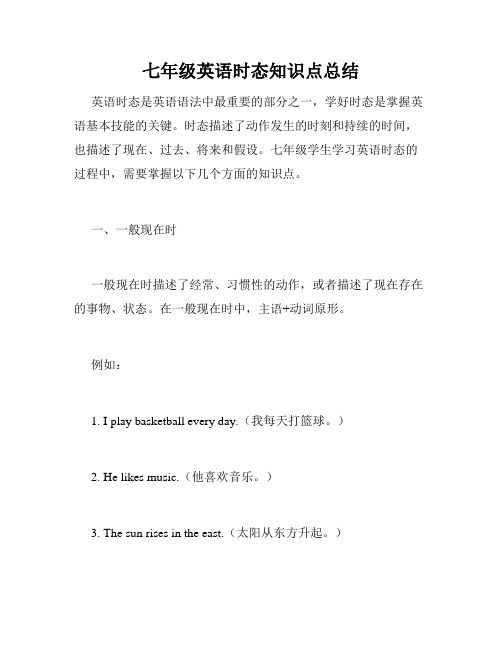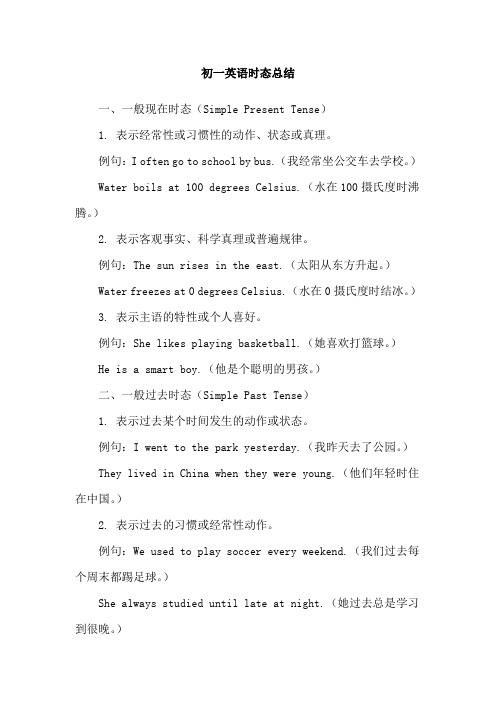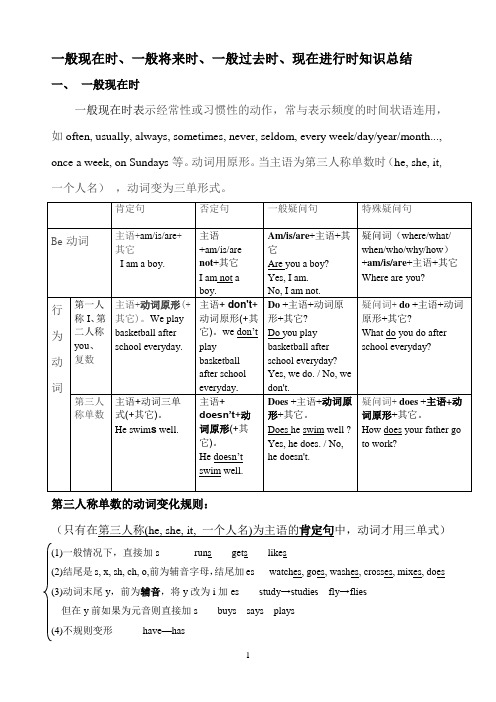新目标七年级下英语时态复习(一般现在时、现在进行时、一般将来时)
七年级下册英语时态知识点

七年级下册英语时态知识点英语时态是英语语法中的重要部分,也是学习和掌握英语的基础。
在七年级的学习中,我们需要掌握以下时态知识点。
一、一般现在时1.基本用法表示客观事实、习惯性动作、科学真理等。
例如:He plays basketball every day.(他每天打篮球。
)The earth moves around the sun.(地球绕太阳转。
)2.特殊用法表示未来安排、计划等。
例如:I take the train at 9 tomorrow morning.(我明天早上9点坐火车。
)二、一般过去时1.基本用法表示在过去某个时间发生的动作或状态。
例如:We walked to school yesterday.(我们昨天步行去上学了。
)2.特殊用法表示过去的习惯。
例如:When I was young, I played football every day.(我年轻时,每天都踢足球。
)三、现在进行时1.基本用法表示现在正在进行或发生的动作。
例如:She is reading a book.(她正在看书。
)2.特殊用法表示即将发生的动作。
例如:I'm meeting my friend at the cinema tonight.(今晚我要在电影院见我的朋友。
)四、过去进行时1.基本用法表示在过去某个时间正在进行的动作。
例如:I was watching TV when he came home yesterday.(昨天他回家的时候我正在看电视。
)2.特殊用法表示过去某个时间正在进行的动作,与另一个动作同时发生。
例如:I was cooking dinner while she was doing her homework.(当时我在做饭,她在做功课。
)五、一般将来时1.基本用法表示将来某个时间要发生的动作或状态。
例如:I will go to the cinema tomorrow.(我明天要去电影院。
七年级英语七年级下册时态复习

七年级英语七年级下册时态复习在七年级英语下册的学习中,时态是非常重要的语法知识点。
掌握好时态,对于我们准确地表达思想、理解英语语言有着至关重要的作用。
接下来,让我们一起对七年级下册所学的时态进行一次全面的复习。
一、一般现在时一般现在时表示经常发生的动作或存在的状态。
当主语是第三人称单数时,动词要发生相应的变化。
比如,“He plays football every day” 中的“plays”就是动词“play”的第三人称单数形式。
一般现在时的构成:1、主语+ be(am/is/are)+表语I am a studentThey are happy2、主语+实义动词(注意第三人称单数形式)We study hardShe likes music常与一般现在时连用的时间状语有:always, usually, often, sometimes, never, every day/week/month/year 等。
二、现在进行时现在进行时表示正在进行的动作。
其构成是“主语+be(am/is/are)+现在分词”。
例如,“I am reading a book now”现在分词的构成规则:1、一般情况下,直接在动词后加 ing,如:read reading。
2、以不发音的 e 结尾的动词,去掉 e 再加 ing,如:write writing。
3、以重读闭音节结尾,且末尾只有一个辅音字母的动词,双写这个辅音字母再加 ing,如:run running。
常与现在进行时连用的时间状语有:now, at the moment, look, listen 等。
三、一般过去时一般过去时表示过去发生的动作或存在的状态。
其构成有两种:1、主语+ was/were +表语I was at home yesterdayThey were late for school2、主语+动词的过去式She played the piano last nightWe went to the zoo last week动词过去式的构成规则有很多,常见的有:1、一般在动词后加 ed,如:work worked。
【新目标】七年级下英语时态复习(一般现在时、现在进行时、一般将来时)201301

七年级下册时态复习(一般现在时、现在进行时、一般将来时)1.完成表格:英语动词根据动作与时间的关系,在句子中有五种基本形式,现在分词。
以下列词为例:3.写出各种动词形式的构成规则:1).第三人称单数2).现在分词时态练习新课标第一网一、写出下列动词的第三人称单数形式和现在分词go ______ ______ enjoy ____ ________ teach ________ ________ eat______ _______ draw ______ ________ study _____ ________ take______ _______ dance____ ________ write ______ ________ run______ _______ swim_______ ________ get _______ ________ open______ _______ cut______ _______ see______ _______ 二.单项选择()1. Wei Hua ______ visit the Great Wall during this summer holiday?A.Do, going toB. Is, going toC. Will, going to()2. ---Where are you going ? ---I ___ the shops for some fruit.A. am going toB. go toC. shall going to go to()3. Mr Green usually ______ newspapers after supper every day.A. readB. readingC. readsD. looks()4. Look! LiPing and Li Ying ________ basketball now.A. playB. playedC. will playD. are playing()5. I ______ music at 6:00 every morning.A. listen toB. listening toC. am listening toD. hear()6. What ______ you ______ with your classmates this Sunday afternoon?A. are, doB.do, doC. will do()7. ______ she ______ home at six o’clock every mornig?A. Do, comesB. Does. comeC. Do, comeD. Is, come()8. There ______ an English party in our class this evening.A. will haveB. are going to haveC. is going to be()9. My father ______ TV with my mother now.A. watchB. watchingC. is watchingD. watches()10. ______ you usually ______ to school with your classmates?A. Do, comesB. does, comeC. Do, comeD. Are, come()11 It’s six o’clock in the evening, My family______ supper at the table.A. eatB. is eatingC. are eatingD. eating()12. My mother __ like watching TV, so she ____to bed very early everyevening.A, doesn’t ,go B.don’t, go C. doesn’t , goes D. don’t , goes ()13. When______ they ______ leave for Beijing?A. will, going .B. will, /C. do, going toD. are, going ()14. --- Where ________ Mr. Green _____ (live) ? --- He ____ in London. ()15. --- ________ you ________ (clean) your bedroom?--- No, I’m not. I’m cleaning the living room.()16. --- ________ Nancy ________ (talk) on the phone?--- No, she isn’t. She ________ (eat) lun ch now.三、用动词的适当形式填空。
七年级英语时态知识点总结

七年级英语时态知识点总结英语时态是英语语法中最重要的部分之一,学好时态是掌握英语基本技能的关键。
时态描述了动作发生的时刻和持续的时间,也描述了现在、过去、将来和假设。
七年级学生学习英语时态的过程中,需要掌握以下几个方面的知识点。
一、一般现在时一般现在时描述了经常、习惯性的动作,或者描述了现在存在的事物、状态。
在一般现在时中,主语+动词原形。
例如:1. I play basketball every day.(我每天打篮球。
)2. He likes music.(他喜欢音乐。
)3. The sun rises in the east.(太阳从东方升起。
)二、一般过去时一般过去时描述了过去某个时刻或者一段时间内发生的动作。
在一般过去时中,主语+动词过去式。
例如:1. They went to the beach last weekend.(他们上周末去了海滩。
)2. I studied English for three hours yesterday.(昨天我学习英语三个小时。
)3. She visited her grandparents last month.(上个月她去看望她的祖父母了。
)三、一般将来时一般将来时描述了将来会发生的动作或者事件。
在一般将来时中,主语+will/shall+动词原形。
例如:1. She will go to the movies with me tonight.(今晚她会和我一起去看电影。
)2. We shall visit our friends in London next month.(下个月我们将会拜访在伦敦的朋友。
)3. They will have a party on Saturday.(他们星期六会有一个派对。
)四、现在进行时现在进行时描述了正在进行中的动作。
在现在进行时中,主语+be动词+动词-ing。
例如:1. He is playing football with his friends now.(他正在和他的朋友们打足球。
七年级下学期语法知识点

七年级下学期语法知识点在学习英语过程中,语法是一个非常重要的环节。
掌握语法知识是提高英语能力的关键。
在七年级下学期中,我们学习了许多重要的语法知识点。
接下来,本文将分别介绍这些知识点。
一、动词时态动词时态是英语语法中最基本、最重要的部分之一。
我们在七年级下学期中学习了四种时态:一般现在时、一般过去时、一般将来时和现在进行时。
1. 一般现在时一般现在时表示现在或经常性的动作或状态。
例如:I study English every day.(我每天学英语。
)2. 一般过去时一般过去时表示已经结束的过去时间里完成的动作。
例如:Yesterday, I went to the park.(昨天,我去了公园。
)3. 一般将来时一般将来时表示发生在将来的动作。
例如:I will visit my grandparents next week.(下周我将会去看望我的祖父母。
)4. 现在进行时现在进行时表示正在发生的动作。
例如:I am studying English now.(我正在学英语。
)二、名词性从句名词性从句是一个比较难懂的语法知识点。
它是在句子中充当名词的从句。
名词性从句可以分为三种类型:主语从句、宾语从句和表语从句。
1. 主语从句主语从句充当整个句子的主语。
例如:What he said was very interesting.(他说的话很有意思。
)2. 宾语从句宾语从句通常作为句子的宾语。
例如:I know that you are a good student.(我知道你是一个好学生。
)3. 表语从句表语从句用作句子的表语部分。
例如:My hope is that we can be good friends.(我希望我们能成为好朋友。
)三、形容词和副词形容词和副词是英语语法中最重要的两个部分之一。
它们描述名词和动词的性质。
形容词通常用来描述名词,而副词则用来修饰动词、形容词和其他副词。
1. 形容词形容词可以用来描述名词的质量和数量等特征。
初一英语时态总结

初一英语时态总结一、一般现在时态(Simple Present Tense)1. 表示经常性或习惯性的动作、状态或真理。
例句:I often go to school by bus.(我经常坐公交车去学校。
) Water boils at 100 degrees Celsius.(水在100摄氏度时沸腾。
)2. 表示客观事实、科学真理或普遍规律。
例句:The sun rises in the east.(太阳从东方升起。
)Water freezes at 0 degrees Celsius.(水在0摄氏度时结冰。
) 3. 表示主语的特性或个人喜好。
例句:She likes playing basketball.(她喜欢打篮球。
)He is a smart boy.(他是个聪明的男孩。
)二、一般过去时态(Simple Past Tense)1. 表示过去某个时间发生的动作或状态。
例句:I went to the park yesterday.(我昨天去了公园。
) They lived in China when they were young.(他们年轻时住在中国。
)2. 表示过去的习惯或经常性动作。
例句:We used to play soccer every weekend.(我们过去每个周末都踢足球。
)She always studied until late at night.(她过去总是学习到很晚。
)3. 表示过去的真理或规律。
例句:Dinosaurs existed millions of years ago.(恐龙存在于几百万年前。
)The Earth was flat according to ancient beliefs.(根据古代的信仰,地球是平的。
)三、一般将来时态(Simple Future Tense)1. 表示将来某个时间或在某个时间之后发生的动作或状态。
例句:I will visit my grandparents next week.(下周我会去看望我的祖父母。
一般现在时、现在进行时、一般将来时、一般过去时知识点总结

一般现在时、一般将来时、一般过去时、现在进行时知识总结一、一般现在时一般现在时表示经常性或习惯性的动作,常与表示频度的时间状语连用,如often, usually, always, sometimes, never, seldom, every week/day/year/month..., once a week, on Sundays等。
动词用原形。
当主语为第三人称单数时(he, she, it, 一个人名),动词变为三单形式。
第三人称单数的动词变化规则:(只有在第三人称(he, she, it, 一个人名)为主语的肯定句中,动词才用三单式)(1)一般情况下,直接加s runs gets likes(2)结尾是s, x, sh, ch, o,前为辅音字母,结尾加es watches, goes, washes, crosses, mixes, does(3)动词末尾y,前为辅音,将y改为i加es study→studies fly→flies但在y前如果为元音则直接加s buys says plays(4)不规则变形have—has二、一般将来时一般将来时表示将来发生的事。
常与tomorrow, next day/week/month/year..., soon, in a few minutes, the day after tomorrow, in the future等时间状语连用。
Will/shall +动词原形;(shall用语第一人称)be(am/is/are) going to+ 动词原形三、一般过去时一般过去时表示过去某一时候或某一段时间所发生了的事情或存在的状态。
常与过去时间yesterday,ago, this morning,just now,a moment ago,last night / year / week/month,once upon a time,the other day,before,the day before yesterday, in 1989, at the age of five, one day, then(那时), on that day,in the past连用。
人教7下语法时态(一般现在时、一般过去时、一般将来时、现在进行时)(13张)

(3)用法: ①主要表示过去的某个时间发生的动作或存在的状态 。如:
His friend was at work yesterday. 他的朋友昨天在工作。 ②表示过去经常或反复发生的动作,常与often, always 等表示频度的时间状语连用,“过去常常做某事”也 可用used to do来表达。如:
(3)用法: ①表示习惯性的动作。常与seldom, often, usually, always,
sometimes, today, every day, once a week, every five minutes, on Sundays等时间状语连用。如:
I go to school at seven every day. 我每天七点去上学。 ②表示普遍真理和客观事实。如: The earth __g_o_e_s_a_r_o_u_n_d___ the sun. 地球绕着太阳转。 ③表示在现在时间里所发生的一个动作。如: Here comes the bus. 公共汽车来了。 ④在时间和条件状语从句中代替一般将来时。如:
I'll go shopping with my mother if she ________ tomorrow. 如果明天我妈妈有空,我将和她去购物。is free
2.现在进行时 (1)结构: am/is/are+动词的ing形式 (2)现在分词的变化规则:
①一般直接加 ing。如:play—playing。 ②以不发音字母e结尾的,去e ing。如: come—coming; make—making; live—living。 ③以重读闭音节结尾,末尾只有一个辅音字母的,先 双写该辅音字母,再加 ing。如: run—running; sit—sitting; begin—beginning ④特殊:die—dying; lie—lying; tie—tying。
- 1、下载文档前请自行甄别文档内容的完整性,平台不提供额外的编辑、内容补充、找答案等附加服务。
- 2、"仅部分预览"的文档,不可在线预览部分如存在完整性等问题,可反馈申请退款(可完整预览的文档不适用该条件!)。
- 3、如文档侵犯您的权益,请联系客服反馈,我们会尽快为您处理(人工客服工作时间:9:00-18:30)。
七年级下册时态复习(一般现在时、现在进行时、一般将来时)
1.完成表格:英语动词根据动作与时间的关系,在句子中有五种基本形式,
现在分词。
以下列词为例:
3.写出各种动词形式的构成规则:
1).第三人称单数
2).现在分词
时态练习新课标第一网
一、写出下列动词的第三人称单数形式和现在分词
go ______ ______ enjoy ____ ________ teach ________ ________ eat______ _______ draw ______ ________ study _____ ________ take______ _______ dance____ ________ write ______ ________ run______ _______ swim_______ ________ get _______ ________ open______ _______ cut______ _______ see______ _______ 二.单项选择
()1. Wei Hua ______ visit the Great Wall during this summer holiday?
A.Do, going to
B. Is, going to
C. Will, going to
()2. ---Where are you going ? ---I ___ the shops for some fruit.
A. am going to
B. go to
C. shall going to go to
()3. Mr Green usually ______ newspapers after supper every day.
A. read
B. reading
C. reads
D. looks
()4. Look! LiPing and Li Ying ________ basketball now.
A. play
B. played
C. will play
D. are playing
()5. I ______ music at 6:00 every morning.
A. listen to
B. listening to
C. am listening to
D. hear
()6. What ______ you ______ with your classmates this Sunday afternoon?
A. are, do
B.do, do
C. will do
()7. ______ she ______ home at six o’clock every mornig?
A. Do, comes
B. Does. come
C. Do, come
D. Is, come
()8. There ______ an English party in our class this evening.
A. will have
B. are going to have
C. is going to be
()9. My father ______ TV with my mother now.
A. watch
B. watching
C. is watching
D. watches
()10. ______ you usually ______ to school with your classmates?
A. Do, comes
B. does, come
C. Do, come
D. Are, come
()11 It’s six o’clock in the evening, My family______ supper at the table.
A. eat
B. is eating
C. are eating
D. eating
()12. My mother __ like watching TV, so she ____to bed very early every
evening.
A, doesn’t ,go B.don’t, go C. doesn’t , goes D. don’t , goes ()13. When______ they ______ leave for Beijing?
A. will, going .
B. will, /
C. do, going to
D. are, going ()14. --- Where ________ Mr. Green _____ (live) ? --- He ____ in London. ()15. --- ________ you ________ (clean) your bedroom?
--- No, I’m not. I’m cleaning the living room.
()16. --- ________ Nancy ________ (talk) on the phone?
--- No, she isn’t. She ________ (eat) lun ch now.
三、用动词的适当形式填空。
新课标第一网
1、Tom ______ (swim) in the river now.
2、Daniel and Tommy_________ (be) in Class One.
3、She usually ______ (do) her homework in the evening.
4、It’s eight o’clock now. The boys ______ (watch) TV.
5、What does your father ______ (do)? He’s a worker.
6、Tom and Tony can’t ______ (swim).
7. Look! Jim and Tom ______ (run) there.
8. He often ____________(have) dinner at home.
9. We _____________(not watch) TV on Mondays.
10. Nick ___________( go) to the zoo this Sunday.
11. ________they_____ (like) the World Cup?
12. What______ they often ________(do) on Saturdays?
13. _________your parents________ (read) newspapers every day?
14. The girl __________(teach) us English on Sundays. X k b1. c om
15. She __________(not do) homework every day.
16. There _____________(be) an English test next Monday.
17. Mike _____________(cook) in the kitchen now.
18. She___________ (visit) the Great Wall this summer holiday.
19. Liu Tao __________(do) not like PE.
20. Don’t talk. The baby ______________(sleep).
四、改错。
划出错误点,并在括号内改正。
( )1. Is your brother speak English now?
( )2. Does he likes going fishing?
( )3. He likes play games after class.
( )4. Mr. Wu teachs us English.
( )5. She don’t do her homework on Sundays.
( )6. She is going to going swimming next Sunday.
( )7. There is going to have a football match tomorrow.。
